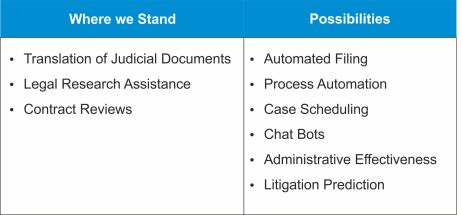- within Energy and Natural Resources, Antitrust/Competition Law and Intellectual Property topic(s)
- in Asia
- with readers working within the Aerospace & Defence, Law Firm and Construction & Engineering industries
Introduction
The Department of Justice is implementing the e-courts Mission Mode Project in close collaboration with the e-committee of the Supreme Court of India with the objective of universal computerization and ICT enablement of all District & Subordinate Court complexes. The Supreme Court of India has set up the Artificial Intelligence Committee to investigate the use of AI in the judicial sector. This committee has primarily identified applications of AI technology in the translation of judicial documents, legal research assistance, and process automation. However, AI technology has not been used in the second phase of the e-courts, which has been in development since 2015.
However, as per the draft Detailed Project Report (DPR), Artificial intelligence (AI) may be used for forecasting and prediction, increasing administrative effectiveness, automated filing, intelligent scheduling of cases, improving the case information system, and communicating with litigants through chatbots that may help with early case resolution.

Exploring the meaning: AI & ML
Section 5002(3) of the National Artificial Intelligence Initiative (NAII) Act 2020 defines the term "artificial intelligence" as a machine-based system that can, for a given set of human-defined objectives, make predictions, recommendations or decisions influencing real or virtual environments.
Additionally, section 5002(11) e of the NAII Act 2020 defines the term "machine learning" as an application of artificial intelligence that is characterized by providing systems the ability to automatically learn and improve on the basis of data or experience, without being explicitly programmed.
As stated by Chief Justice of India D.Y. Chandrachud, "technology is relevant insofar as it fosters efficiency, transparency, and objectivity in public government. AI is present to provide a facilitative tool to judges in order to recheck or evaluate the work, the process, and the judgments." The primary purpose is to give common people greater access to justice in the long run.
Regulatory Approach Towards AI: Global and Indian Perspective
The EU proposed the Artificial Intelligence (AI) Act in 2021 with the goal of ensuring that AI systems are secure and uphold the fundamental rights of those who fall under its purview. Additionally, the act aims to stop market fragmentation within the EU. The proposed law is already a topic of discussion on a global scale. The Brazilian Congress adopted a Bill to establish a legal framework for AI as a result of the proposal. Canada presented the Digital Charter Implementation Act to the House of Commons in June 2022. It includes three pieces of legislation that aim to make Canada's data privacy framework stronger and guarantee the ethical advancement of AI.
- Rooting for Dedicated Legislation on AI in India
As rightly pointed out by a leading tech journalist Zinnia Banerjee "India is part of the Global Partnership on Artificial Intelligence (GPAI), an international initiative to support responsible and human-centric development".
India has moved up the ladder and taken the GPAI Council Chair position as of this November. Virtually representing India at the GPAI meeting in Tokyo for the symbolic handover from France was Rajeev Chandra, Minister of State for Electronics and Information Technology(MEITY).
- India's Regulatory Approach Towards AI So Far
Currently, there are no specific laws in India with regard to regulating AI, ML. Ministry of Electronics and Information Technology (MEITY), the executive agency for AI-related strategies, recently constituted four committees to bring in a policy framework for AI.
The Niti Aayog has developed a set of seven responsible AI principles, which include safety and dependability, equality, inclusivity and non-discrimination, privacy and security, transparency, accountability, and the protection and reinforcement of positive human values. These principles are expected to protect the public interest while also encouraging innovation through increased trust and adoption.

Above mentioned principles are very similar to Asilomar Principles and the Beijing Principles.
The think tank has also worked with a number of AI technology companies to implement AI projects in critical areas such as education, agriculture, and health. Furthermore, the Department of Telecommunications has formed an AI standardisation committee to develop various interface standards as well as India's AI stack.
The Judiciary plays a vital role in enforcing specific provisions. The Supreme Court and high courts have the constitutional mandate to enforce fundamental rights, including the right to privacy.
SEBI The regulator has developed a system based on artificial intelligence (AI) that scans various stock market shows and builds a database of recommendations made, said people with direct knowledge of the matter.
SEBI has named it Picture-based Information News Accumulator and Key Information Analyser (Pinaka).
The Reserve Bank of India (RBI) is planning to extensively use advanced analytics, AI and ML to analyze its huge database and improve regulatory supervision of banks and NBFCs. The objective of this step is to enhance the data-driven surveillance capabilities of the Reserve Bank.
Legal Tech Trends in the Indian Legal industry: A new era for lawyers
Legal tech in India, a late bloomer but rapidly growing sector, is quickly moving from the margins to becoming an important point of discussion in the mainstream legal industry. Legal tech is showing great promise in reinventing the Indian legal industry, whether it is optimising legal research for lawyers, streamlining operations for law firms and in-house teams alike, or enabling citizens at large to access justice.
Legal technology has attracted a lot of attention in the Indian entrepreneurial ecosystem, especially since 2017. Many entrepreneurs are developing novel legal technology solutions to problems that have received little attention for decades, if not centuries. Every year, new legal technology start-ups appear on the scene. As a result, here are some of the leading Indian legal-tech start-ups that have swept the Indian legal market.
Legit Quest: is a website for legal research that makes it simpler for legal researchers to conduct in-depth and thorough studies by using artificial intelligence (AI) to make connections between various case laws. avoids the need to transform case facts into searchable legal arguments by obtaining highly relevant search results directly from a brief (or other related legal documents).
ZAIAN - The world's first Real Time Analyser of Case Law with the use of Artificial Intelligence. Make IDRAF (Issue, Facts, Arguments, Reasoning & Decision) with Legitquest's proprietary algorithm. Just select the court if you know and paste judgment text in this box and see the magic!
Legal Kart: Legalkart's goal is to make "Legal access" neutral and accessible, thereby democratising it. The goal is to have zero litigation, so they are developing the first "Preventive Legal Care Ecosystem" for everyone.
Few tiered firms have recognized AI's capabilities and is enthusiastically adopting it. They have achieved history by becoming the first Indian law practice to license "Kira," a machine learning program developed by Kira Systems in Canada. With the Covid push factor and increase in the use of online tech regime, there arises the need for AI oriented laws in India.
Future of AI with Judgment Outcome Prediction
Using the corpus of pertinent precedent and the case facts as inputs, a few AI teams are creating machine learning models to predict the outcomes of pending cases. These predictions will significantly affect legal practice as they are refined. They are being used by law firms to streamline settlement negotiations, decrease the number of cases that must go to trial, and plan out their litigation strategy in advance.
Blue J Legal, based in Toronto, is one such company working on an AI-powered legal prediction engine, with an initial concentration on tax law. According to the business, its AI can accurately anticipate case outcomes 90% of the time.
In the coming years, India should also develop such an interface as it will help courts to reduce pending litigations and urgent matters where litigation cannot be avoided can be dispose of.
AI: A lawyer's replacement?
Numerous cutting-edge developments in the legal industry have been made to boost lawyer's productivity through contract analysis, trademark search software, legal research software, and other techniques. However, none of the AI-based software aims to replace attorneys; instead, it strives to improve the accuracy and precision of study and analysis.
In India, the legal sector is still growing, and more AI-based and automated tools are on the way. These AI-based automated assistance programmes will not replace the analysis, stratification, and decision-making required by the legal profession; rather, they will increase lawyers' efficiency and competence while automating many clerical tasks.
Bhavika Verma, Intern at S&P, student at National Law University, Jodhpur, assisted in drafting of this article.
The content of this article is intended to provide a general guide to the subject matter. Specialist advice should be sought about your specific circumstances.



